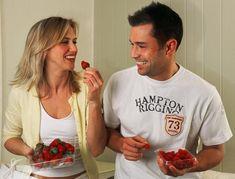
A slowdown in the growth of the soft-fruit market was in the spotlight at the British Berry Conference, in Birmingham, on Tuesday. Nick Marston, managing director of KG Fruits, urged the industry to wake up to what the consumer wants in order to continue growing the market.
Marston said: “In the past I have stood here and told growers to plant more and increase production to grow the market, but it isn’t that simple anymore.
“We must aim to achieve a growth that matches demand but still delivers a profit and a return on investment.
“As an industry we need to invest in finding out what consumers want, and what they have come to expect, in order to support our investment in R&D, which is enormous.”
Dr Andrew Fearne, speaking on behalf of dunnhumby Academy of Consumer Research and Kent Business School, urged industry figures to take the right action to address the decline in market growth.
He said: “The growth in the soft-fruit category is slowing, and the industry cannot wait too long to act.”
Fearne presented the findings of a two-year analysis of Tesco Clubcard data for 1.2 million households. “This data delivers a world-class insight to producers, and stands as an amazing resource which should not be underestimated,” he said. “This is what consumers actually did, not what they said they would do.”
There are 12m active Clubcard users in the UK that correspond to 40 per cent of UK households.
The study showed that promotions linked to strawberries could be the key to market development. A total of 63 per cent of Tesco strawberry shoppers buy no other berries, 42 per cent of raspberry buyers also purchase strawberries, and eight per cent of consumers that buy strawberries also opt for raspberries and blueberries, according to the Clubcard data.
“But the industry has to think of ways to promote berries other than price cuts,” Fearne warned. The research showed that a Tesco blueberry price cut of 32 per cent in July and August saw volume sales increase by 48 per cent while value sales rose by only one per cent.
But Marston said the £250m soft-fruit industry has a lot of growth potential. He praised “the usual suspects” Tesco and Sainsbury’s, as well as Marks & Spencer, for a strong performance this year, and named Asda and Morrisons as the key underperformers in the berry category.
Marston said premium had emerged as a stand-alone market in 2006 and the segmentation of the soft-fruit market into premium, standard and value lines had become clearer.
He said: “The major supermarkets are offering three packs that appeal to different consumer groups.
“The segmentation of the industry is a very exciting prospect, and we are seeing an increasing range of varietal material with different eating qualities.”



